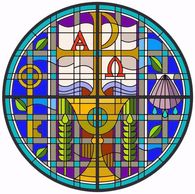
Sacraments
Sacraments are the "outward and visible signs of inward and spiritual grace." The sacraments remind us that we always encounter the living God in the most common things of life. Water, food, drink, oil, touch, taste, words and being in relationship with others. If we are mindful, we can discover the sacredness of everyday life. All of life is holy and God is ever ready to reveal the reality of the sacredness of everything. Sacraments are ways we can encounter the grace of God in the realities of Human life. Some are rites of passage, common in all cultures, but all are reminders of the ever present God who calls us to celebrate the sacredness of all life.
The two primary sacraments of the Christian tradition are:
Holy Baptism: Administered only once as a pledge of repentance and trust in the teachings and example of Jesus Christ. It is the means by which we become members of the Christian community, the Church.
Holy Eucharist: In the Eucharist we share bread and wine for the continual remembrance of the life of Jesus. Through it we receive the strengthening of our union with the example of Jesus and one another.
There are five other sacramental rites that have historically developed in the Christian community:
Confirmation: the rite in which we express mature commitment to the teachings of Jesus and receive strength through prayer and the laying on of hands by a Bishop.
Reconciliation: the confession of ones sins to God in the presence of a priest and the receiving of the assurance of God's continual forgiveness and grace.
Anointing of the Sick: the anointing of the sick with oil, and the laying on of hands, by which God's grace is realized for the healing of spirit, mind, and body.
Ordination: the sacrament consecrating Christians in service to God as bishops, priests and deacons.
Holy Matrimony is Christian marriage, in which two persons enter into a union that is by intention life-long, making their vows before God and the Church, and receiving the grace and blessing of God and the Church to help them fulfill their vows.
These are certainly not the only sacraments in life, but as Christians, we celebrate these, along with our spiritual ancestors, as proven vehicles for realizing the constant presence of God in all things.
Sacraments are the "outward and visible signs of inward and spiritual grace." The sacraments remind us that we always encounter the living God in the most common things of life. Water, food, drink, oil, touch, taste, words and being in relationship with others. If we are mindful, we can discover the sacredness of everyday life. All of life is holy and God is ever ready to reveal the reality of the sacredness of everything. Sacraments are ways we can encounter the grace of God in the realities of Human life. Some are rites of passage, common in all cultures, but all are reminders of the ever present God who calls us to celebrate the sacredness of all life.
The two primary sacraments of the Christian tradition are:
Holy Baptism: Administered only once as a pledge of repentance and trust in the teachings and example of Jesus Christ. It is the means by which we become members of the Christian community, the Church.
Holy Eucharist: In the Eucharist we share bread and wine for the continual remembrance of the life of Jesus. Through it we receive the strengthening of our union with the example of Jesus and one another.
There are five other sacramental rites that have historically developed in the Christian community:
Confirmation: the rite in which we express mature commitment to the teachings of Jesus and receive strength through prayer and the laying on of hands by a Bishop.
Reconciliation: the confession of ones sins to God in the presence of a priest and the receiving of the assurance of God's continual forgiveness and grace.
Anointing of the Sick: the anointing of the sick with oil, and the laying on of hands, by which God's grace is realized for the healing of spirit, mind, and body.
Ordination: the sacrament consecrating Christians in service to God as bishops, priests and deacons.
Holy Matrimony is Christian marriage, in which two persons enter into a union that is by intention life-long, making their vows before God and the Church, and receiving the grace and blessing of God and the Church to help them fulfill their vows.
These are certainly not the only sacraments in life, but as Christians, we celebrate these, along with our spiritual ancestors, as proven vehicles for realizing the constant presence of God in all things.

